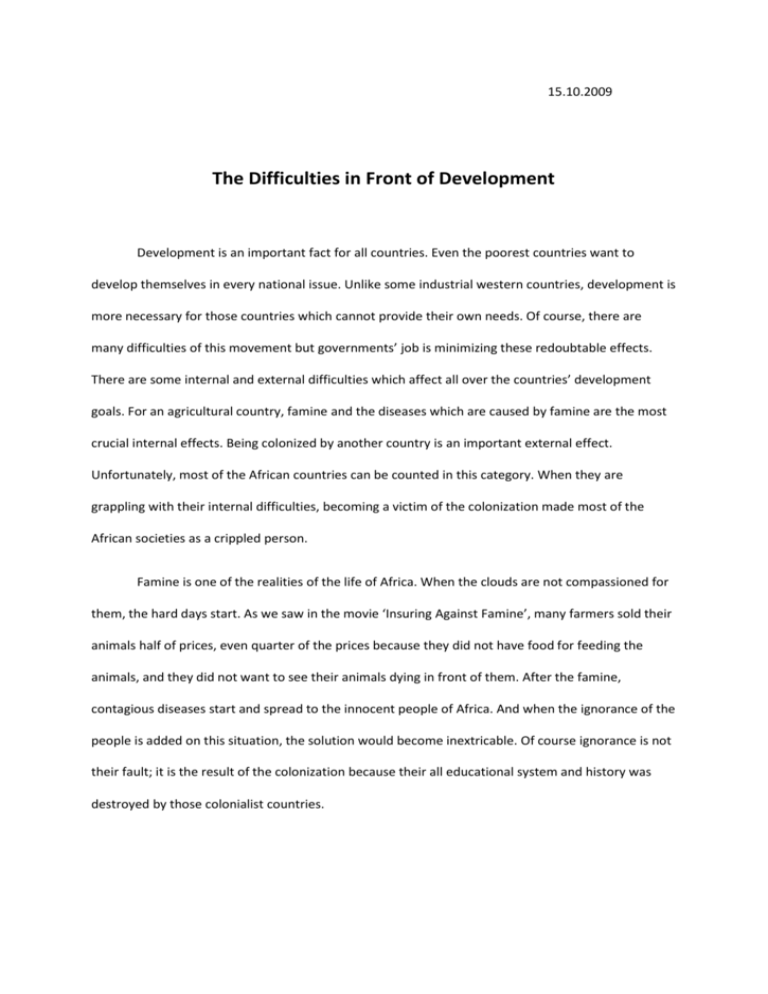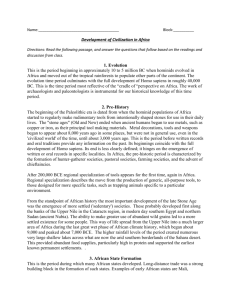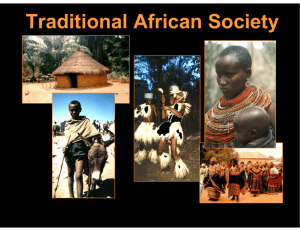The Difficulties in Front of Development
advertisement

15.10.2009 The Difficulties in Front of Development Development is an important fact for all countries. Even the poorest countries want to develop themselves in every national issue. Unlike some industrial western countries, development is more necessary for those countries which cannot provide their own needs. Of course, there are many difficulties of this movement but governments’ job is minimizing these redoubtable effects. There are some internal and external difficulties which affect all over the countries’ development goals. For an agricultural country, famine and the diseases which are caused by famine are the most crucial internal effects. Being colonized by another country is an important external effect. Unfortunately, most of the African countries can be counted in this category. When they are grappling with their internal difficulties, becoming a victim of the colonization made most of the African societies as a crippled person. Famine is one of the realities of the life of Africa. When the clouds are not compassioned for them, the hard days start. As we saw in the movie ‘Insuring Against Famine’, many farmers sold their animals half of prices, even quarter of the prices because they did not have food for feeding the animals, and they did not want to see their animals dying in front of them. After the famine, contagious diseases start and spread to the innocent people of Africa. And when the ignorance of the people is added on this situation, the solution would become inextricable. Of course ignorance is not their fault; it is the result of the colonization because their all educational system and history was destroyed by those colonialist countries. Colonization was the reality of Africa too. With the starting of industrial revolution, the necessity of raw materials and the source of cheap labor increased. When those western countries could not find enough resources in their own countries, they start to look for them. They find the solution by exploiting other countries’ resources. First of all they came together and shared out all the Africa and next, they start to put their plan on action. Their methods were very harmful for those African countries. They destroyed their cultures, changed their educational systems, in short; they did everything to take those agricultural countries under control. As we saw in the movie ‘Timbuktu Scribes’, there is a huge cultural genocide. In the 15th and 16th centuries, Timbuktu was one of the most famous cities in Africa. It was the center of education. There were libraries and universities. The thought which was given us by European countries that African countries are backward in all conditions was not true in that time. They were changed all of the African people’s mind that they are underdeveloped and they need colonialist countries to live. In 2002, the prime minister of the south Africa visited Timbuktu and when he saw those valuable Timbuktu manuscripts he surprised and said that “All of those are African manuscripts, written by Africans? That is amazing!” It shows us that even a president of an African country could not think that their culture would be so ahead like that. Those manuscripts were barely saved by the native people, some of them were buried under desert, and only a little part of it can survived from that cultural genocide. Now, when we look at the Africa map, we can see the colonial borders. Even same societies were divided into many groups by the European countries. In short, there are many borders which are in front of the African societies’ development movement. Some of them are internal, some of them are external. But the biggest bias is in the Africans’ mind that they are backward and they cannot catch-up those industrialized societies. If these countries want to develop, they have to destroy their biases about what they are capable of. Then they have to get rid of the effects of the European countries. Turning back to their own values and make them to fit the era is the first condition for development.











